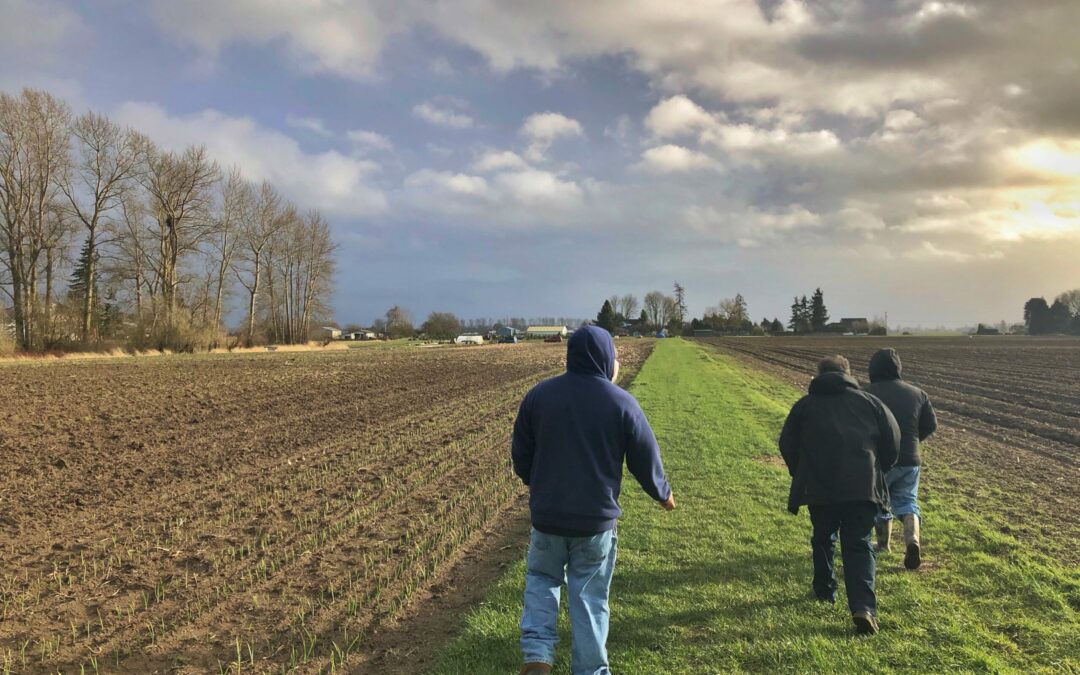Summer has now ended and we have started the countdown to winter. What does this mean for the farmworker? Eber Rivera, our Food Access Specialist in Skagit and Whatcom Counties, has been meeting with local farmworkers and community organizations to learn how the colder months will affect these communities.
Most years, summer is the busiest time for farmworkers and migrant families in Whatcom and Skagit Counties. Typically through mid-September, berry picking season brings large crowds of farmworkers to Western Washington. But with the scorching sun of this summer, many of the fruits ripened faster. This cut short farm work for those who made the long road trip from other states to Washington for the season.
Eber talked to Marcelina Mendoza, the Promotora de Salud at Skagit County Public Health, to learn more about the summer heat’s impact on farmworkers. She works with the indigenous groups of Mixtecos, Triquis, and others from the valley of Mexico who have migrated to Skagit Valley.
“Work for migrant folks will slowly start to decrease as we get closer to winter and people who did not use the food banks will start going as we get closer to the winter season,” Marcelina shared.
Kelsey Harrington, the Director of the Agape Service Project in Whatcom County, relayed to Bellingham Food Bank that at the final Agape Food Bank this summer, about 40% of the clients said they live in Whatcom County year-round.
Local food banks are prepared to meet increased need as we head into winter. Tri-Parish and Bellingham Food Banks have added culturally relevant foods to their distributions, each finding creative ways to combat hunger. So far people who have attended the drive-through at Tri-Parish have been excited to see foods that they know how to prep and cook. Bellingham Food Bank has extended its shopping hours and have created a real grocery shopping experience for community members with no limits on what people can take to be sure they can fully meet the needs of their visitors.
This coming season will be challenging, but the people working to end hunger in both Skagit and Whatcom Counties have committed to keep the families there feed. At the same time the community members continue to support one another in spite of the hardships and uncertainty the following seasons may bring.
Spanish:
El verano ha terminado y hemos comenzado la cuenta atrás para el invierno. ¿Qué significa esto para el trabajador agrícola? Eber Rivera, nuestro especialista en acceso de alimentos en los condados de Skagit y Whatcom, se ha estado reuniendo con trabajadores agrícolas locales y organizaciones comunitarias para aprender cómo los meses más fríos afectarán a estas comunidades. La mayoría de los años, el verano es la época de mayor actividad para los trabajadores agrícolas y las familias migrantes en los condados de Whatcom y Skagit. Por lo general, hasta mediados de septiembre, la temporada de cosecha de moras atrae a grandes multitudes de trabajadores agrícolas al oeste de Washington. Pero con el sol abrasador de este verano, muchas de las frutas maduraron más rápido. Esto acortó el trabajo agrícola para aquellos que hicieron el largo viaje por carretera desde otros estados a Washington durante la temporada.
Eber habló con Marcelina Mendoza, la Promotora de Salud de Salud Pública del Condado de Skagit, para aprender más sobre el impacto del calor del verano en los trabajadores agrícolas. Marcelina Trabaja con los grupos indígenas mixtecos, triquis y otros grupos del valle de México que han migrado al valle de Skagit. “El trabajo para las personas migrantes comenzará a disminuir lentamente a medida que nos acerquemos al invierno y las personas que no usaron los bancos de alimentos comenzarán a ir a medida que nos acerquemos a la temporada de invierno”, compartió Marcelina. Kelsey Harrington, directora del Proyecto de Servicio Agape en el condado de Whatcom, le comunicó al Bellingham Food Bank que en el último banco de comida que hizo Agape de este verano, alrededor del 40% de los clientes dijeron que viven en el condado de Whatcom durante todo el año.
Los bancos de alimentos locales están preparados para satisfacer las crecientes necesidades a medida que nos acercamos al invierno. Los Bancos de comida Tri-Parish y Bellingham han agregado alimentos culturalmente relevantes a sus distribuciones, cada uno encontrando formas creativas de combatir el hambre. Hasta ahora, las personas que han asistido al drive-through en Tri-Parish se han emocionado al ver alimentos que saben cómo preparar y cocinar. Bellingham Food Bank ha ampliado su horario de compras y ha creado una experiencia real de compra de comestibles para los miembros de la comunidad sin límites en lo que las personas pueden tomar para asegurarse de que pueden satisfacer plenamente las necesidades de sus visitantes. La próxima temporada será un desafío, pero las personas que trabajan para acabar con el hambre en los condados de Skagit y Whatcom se han comprometido a mantener alimentadas a las familias. Al mismo tiempo, los miembros de la comunidad continúan apoyándose unos a otros a pesar de las dificultades y la incertidumbre que pueden traer las próximas temporadas.

